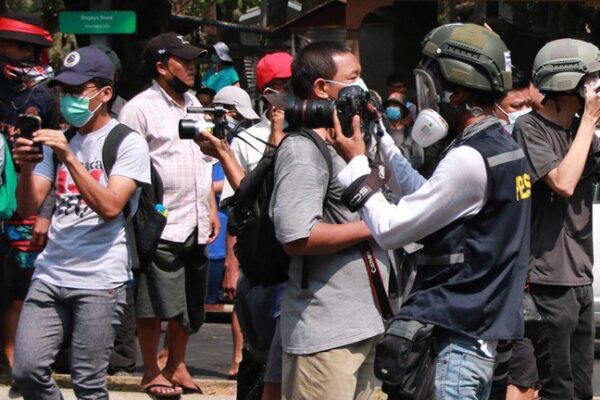
Another junta battalion surrenders to rebels in Myanmar’s Shan state
A light infantry battalion with more than 120 troops surrendered to ethnic rebels – the second time in two weeks that a battalion belonging to Myanmar’s military junta has laid down arms to rebel forces in northern Shan state. The entire Light Infantry Battalion 129, including its commander and 134 family members, surrendered on Sunday to the Myanmar National Democratic Alliance, a spokesman for the rebel group told Radio Free Asia. “We welcome the soldiers who have surrendered to us,” MNDAA spokesman Li Kyarwen said. “We are also safeguarding them. The injured persons are getting medical treatment. We have safely transported them to their expected destination.” Each of the junta soldiers was awarded 1 million kyat (US$476) while one family member was given an additional 100,000 kyat (US$47), Li Kyarwen said. The junta battalion was based near the border with China in Laukkaing, one of about a half dozen areas in Shan state targeted during a coordinated military offensive launched last month by an alliance of three ethnic armies. Reports show that the Three Brotherhood Alliance – made up of the MNDAA and the Ta’ang National Liberation Army in Shan state and the Arakan Army in Rakhine state – has taken some 150 military camps in battles throughout Shan state, causing alarm among top military brass. On Oct. 30, all 41 members of Light Infantry Battalion 143, including a deputy commander and two company commanders, surrendered to the MNDAA in Shan’s Kunlong township. A total of 127 Myanmar army soldiers and 134 of their family members – 261 people – surrendered to the Myanmar National Democratic Alliance on Nov. 12, 2023 in northern Shan state. Credit: Three Brotherhood Alliance Junta chief Senior Gen. Min Aung Hlaing said last week that the alliance’s Operation 1027 – named for the date that the offensive began – could “break the country into pieces” if left unchecked. RFA attempted to contact a spokesman for the military junta for comment on the latest battalion surrender, but phone calls went unanswered on Tuesday. No reinforcements On Sunday, the junta declared martial law in eight townships in Shan state, including Laukkaing. But troops in the region haven’t received military reinforcements recently, which must have been a contributing factor in the battalion’s choice to give up, said Than Soe Naing, a military and political observer. “They didn’t think that it was worthy for them to sacrifice the lives of more than 200 people, including soldiers and their families,” he said. “In this helpless situation, they made the decision to surrender.” That was the right decision for commanders to make, said Captain Lin Htet Aung, a former military officer who joined the non-violent Civil Disobedience Movement, or CDM, in opposition to the junta. “We have seen considerable losses to the military in recent battles, and we haven’t heard the military express condolences or offer encouragement,” he said. “So, junta soldiers should think about whether they should sacrifice their lives to protect these leaders.” Junta forces also suffered a loss during fighting on Monday near the Indian border in western Myanmar’s Chin state. More than 40 junta soldiers fled across the border and were later handed back to Myanmar authorities by Indian forces. Additionally, fighting between the Arakan Army and junta troops in Rakhine state has intensified in recent days. And in northeastern Myanmar, Karenni Nationalities Defense Force targeted junta bases in Loikaw University and a prison in the capital of Kayah state on Saturday. Translated by Aung Naing. Edited by Matt Reed and Malcolm Foster.








